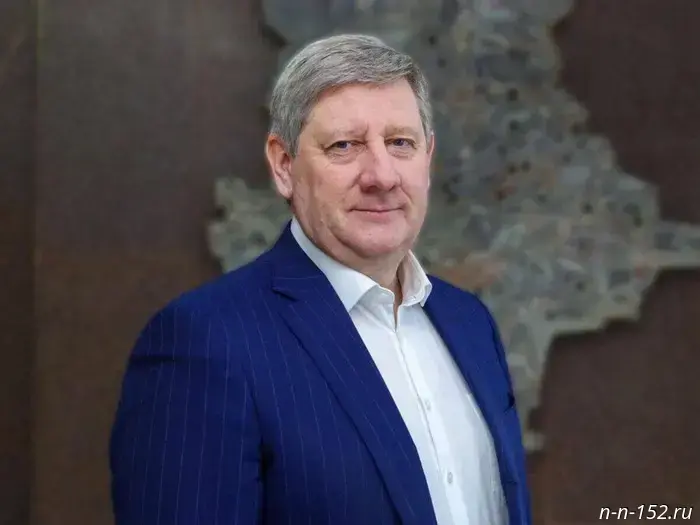
Andrei Chertkov: "I've grown attached to Donetsk."
NIA "Nizhny Novgorod" — Anastasia Nazarova
On September 30, 2022, the Donetsk and Lugansk People's Republics and the Kherson and Zaporizhzhia regions officially became part of the Russian Federation. By that time, former Nizhny Novgorod minister Andrey Chertkov had already been heading the DPR Ministry of Coal and Energy for several months. The appointment came as a complete surprise both to him and to people in Nizhny Novgorod. At the time he could not have imagined that his life would become inextricably linked to the new region. But it so happened that by May 2023 Chertkov became the first deputy chairman of the government, in March 2025 — acting chairman, and in mid-September the head of the DPR, Denis Pushilin, announced the new status of the native of Nizhny Novgorod Oblast — he was made chairman of the government.
Editor-in-chief of NIA "Nizhny Novgorod" Anastasia Nazarova got in touch with Andrey Chertkov to talk about the nuances of working in such a high position, the grand plans for restoring the DPR, the pace of life that not everyone can endure, and the prospect of becoming a governor. She also managed to learn the well-known countryman's opinion about the merger of Nizhny Novgorod with Kstovo, the closure of the Vodnik stadium, and rumors about Chertkov moving to the federal government.
– Andrey Gennadyevich, you headed the DPR government. Can we congratulate you on that?
— Well, I suppose (smiled). After all, I was acting chairman for six months before this. Now the tasks have increased, and the responsibility has grown.
— What were your feelings when you accepted this appointment?
— I'll start by saying that "varangians" are not easily accepted here. But that's true in any region. The mentality of people in the DPR is special, and they are particularly wary of newcomers. So it was doubly pleasant that when the head of the republic Denis Pushilin approved my candidacy, the residents reacted positively. "Seems like he's one of us," they said. It's nice when people call you a native.
That's probably the main emotion. At the same time I understand: a great responsibility now rests on me. The main tasks are restoring and developing the republic, solving water problems.
— How are things with personnel?
— There is a shortage of personnel. Many people left the territory; a reverse migration must take place. I really hope for it. I recently met with students and asked: "What can we do to make you stay in the region? What do you need: good salaries, housing, leisure?" I'm waiting for feedback from the youth. And I expect those who left in 2022–2023 to return. We see that people are slowly starting to come back, but we want everyone to return.
— And we want you to come back.
— Everyone loves working with me (laughs). But everything is in God's and the president's hands.
— Your career trajectory resembles the path of Evgeny Solntsev, who was elected governor this fall. Do you allow for such a development of events for yourself?
— The comparison may be fair, but we have different career ladders. You know mine: entrepreneur, district head, first deputy mayor, housing and communal services minister, head of local government. In the Donetsk People's Republic I started as a minister and rose to chairman of the government. Evgeny Alexandrovich took a different path. He did not go through municipal service. He mainly worked on the country's construction sites, and heavy ones at that. He has rich experience in restoration, which is why Marat Khusnullin chose him. We worked as a pair: he handled restoration, I handled housing and utilities, transport, roads, and energy.
In some ways we can be compared, but what will happen next is unclear. There is a lot of work ahead. Territories are being liberated, civilians are returning. They need water, heat, energy, banking services, pension and salary payments. In ordinary regions all this already exists and they work on improvements. Here there is emptiness; peaceful life has to be rebuilt from scratch. Plus demining is the main reason we cannot fully enter some settlements.
— The head of government has an irregular working day. You're a workaholic, but it must still be hard. How do you feel in this rhythm?
— I'm used to it. I'm at work from 7:30 a.m., because at eight — the first VKS meeting. We often finish at nine in the evening, then there are phone calls and paperwork. The head of the DPR holds water headquarters every evening. And the heating season is just around the corner.
– Do you ever take vacations?
— Last year I was given two weeks in spring. I spent one week in Nizhny with my family, the second in Moscow, where there was even more work than here. There I met with federal ministers and corporations, we arranged assistance for the region. That work is also extremely important.
To be honest, as someone who has lived his whole life at the confluence of two huge rivers, I miss water a lot. I love to swim.
– At the EEF-2025 you announced a goal to build about 8 million sq. meters of housing by 2030. How realistic is that? And is participation by people from Nizhny planned?
— Let the people of Nizhny decide for themselves whether they want to participate or not. That's more the business of large development companies. In general, the region helps a lot. Thanks to Gleb Nikitin. Even now, amid water shortages, the region helps with tanks and water deliveries. Deep gratitude. I know there are plans to build a sanatorium. That would be wonderful — not only for our kids. As for housing construction — whether Nizhny Novgorod companies want to come or not, I don't know.
But yes, one of our grand plans, agreed at the federal level with Marat Khusnullin and the Russian minister, is 8 million sq. meters by 2030.
– A tall order, it seems to me.
— It's really hard. Last year we delivered about 400 thousand square meters; this year we plan 750 thousand. Next year the task is to exceed a million. To build 8 million square meters of housing, it's necessary to prepare 25 million square meters of development potential.
By the way, we have preferential mortgages at 2%. Buying property in Sochi has become difficult; vacations there are expensive. Now I tell investors and residents: "Guys, you have a region where the mortgage is 2%. Buy and you'll be lounging, or working under a palm tree by the sea."
Only thing is, prices here have risen a bit now, but I still think they'll return to 150 thousand rubles per square meter. I consider that the optimal price. And if you take a mortgage for 20 years, the monthly payment comes to 15–20 thousand rubles. I hope many residents of Central Russia, among others, will take advantage of this offer.
– Returning to the issue of labor resources. How many workers will the DPR need by 2030?
— According to our estimates, as industry is restored, about 500 thousand will be needed by 2030. We expect that a little over 100 thousand will return from the SVO (we have many experienced fellows fighting with us). We also count on reverse migration. And the rest of the workforce will be people who want to come from other regions to apply their knowledge and skills here.
We are now preparing a strategy for the republic's further development. It's important to determine priorities. Previously, the industrial base here was coal, metallurgy, and heavy engineering. Today priorities may change depending on factory restorations and investor arrivals. We'll discuss this with regional authorities, industrialists, entrepreneurs, students, and federal structures.
– On September 30, 2022, the DPR, LPR, Zaporizhzhia and Kherson regions officially joined the Russian Federation. At that time you had already been minister of coal and energy for several months. History was being made right before your eyes. Do you remember that time?
— The residents of the DPR were all waiting for reunification. The referendum lasted a week. Then queues formed of those wishing to cast their votes in favor of reunification with Russia. We warned them of the danger — there were constant shellings — but the stream of people kept coming... On September 30 the DPR returned to its native harbor. That is the position of all the republic's residents. And that can't be undone.
– Andrey Gennadyevich, who are you today: still a person from Nizhny or already a Donetsk resident?
— A year here is like three (smiled). Of course, I have become dear to everyone. When people ask about Nizhny, I'm a bit at a loss, because I am now in fact more a resident of the Donetsk People's Republic than of Nizhny Novgorod, even though I lived over 50 years in Gorky/Nizhny Novgorod Oblast.
Life there is measured. You know what tomorrow will bring. You start families, make plans. Everything is fairly calm. Here I sort of know my schedule, but I don't know how the day will end or with what.
Actually I'm very happy for the people of Nizhny and I never tire of thanking Gleb Sergeyevich for what he has done for Nizhny. Tons of tourists, life is buzzing. But we have our own special activity here. Yes, I can't always go out for a walk. I was a minister — I walked, even though it was forbidden. Now I can't allow myself that.
– So you miss a certain "Nizhny" freedom?
— You could say that. And only in the DPR did I begin to understand the breadth of Nizhny Novgorod. In our republic there are no rivers more than a kilometer wide. There is no spit you can look at from a slope and be proud of the place where you live.
Again, the people here are different, with a different mentality. Everyone has such an inner core! Especially those who have lived here all their lives and have been enduring hostilities since 2014. Watching the elderly and children die, enduring all that... Probably not everyone can go through it. And they are still working.
– One water crisis is worth something, I suppose.
— Yes, that's the most pressing problem. We've been blockaded, like Crimea once was. Thank God we provide our own energy, but water is lacking. The Donetsk-Makeevka and Yenakiieve agglomerations receive about 90 thousand cubic meters per day, while they need 300 thousand. I really hope that the water transfers we are making will produce the expected result by December, and we can supply water to the population at least once every two days. For now we have to dance with a tambourine to make it rain. I'm joking.
At the moment we are additionally installing storage tanks in the cities and regularly filling them. And the bottled water brought to us from across the country is immediately distributed to hospitals, schools, and kindergartens.
– Do you follow news from the Nizhny Novgorod region? We had a merger of Kstovo with Nizhny. You predicted this, but did you think it would happen so soon?
— Honestly, I was surprised. I expected Bor to be annexed first. And that would perhaps have been more correct. But I didn't make that choice. Most likely it was coordinated with the federal center, because the main enterprises are located in Kstovo district, and the land there is attractive. In any case, whatever is done is for the best.
– Who do you think is next in line to merge with Nizhny?
— I think Bor, then Bogorodsk. Although it's a bit far from Novinki, about 20 kilometers. But this is a decision for Nizhny Novgorod authorities and deputies.
– Another big piece of news is the closure of the Vodnik stadium, which was declared unsafe. What do you think about this?
— For about fifteen years we have been saying that Vodnik should be restored. There were many investors; some even wanted to build houses there. We were categorically against that. There were several restoration projects. Wonderful projects, by the way, but for some reason none was implemented in the end...
Vodnik is a people's stadium and, in my opinion, it should remain so. There's no point in making it luxurious. Just preserve it and give residents the opportunity to do sports. As with Dynamo.
– The summer before last, Nizhny Novgorod media wrote that you were selling off property. It was said that this was supposedly connected with your upcoming appointment to the government of the Russian Federation. Who and why spreads such rumors?
— I don't know who spreads them. Indeed, I partially sold real estate; my wife sold a kindergarten. But the house in Nizhny remained. It's just that for obvious reasons I can't live there now.
As for an appointment, there was none and there is none. I have a lot of work here to restore Donbass for the next 3–5 years. And I'm attached to Donetsk. I try to be immersed in all issues, meet residents. As in Nizhny Novgorod Oblast, I dive into the problems. I can't be fixed (smiled).
– So even as chairman of the government you still manage to stay in dialogue with people?
— The first link of communication with residents is, of course, the municipalities. And there are problems that should be solved exactly at the municipal level. There is also the regional level. The head and I do not meet with people very often, but that is related to security. The enemy does not sleep! We have to warn the public about a meeting literally the day before. Obviously, a small group of people gathers for it, and we hear far from the majority's opinion. But in any case we try to help with all complaints of our residents.
Once someone said to me: "Andrey Gennadyevich, your credo is 'help'." I replied: "Great. I'll remember that." That's how I live in this status.
NIA "Nizhny Novgorod" has a Telegram channel. Subscribe to stay informed about major events, exclusive materials, and timely information.
Copyright © 1999–2025 NIA "Nizhny Novgorod". When reprinting, a hyperlink to NIA "Nizhny Novgorod" is mandatory. This resource may contain 18+ materials.





Другие Новости Нижнего (Н-Н-152)
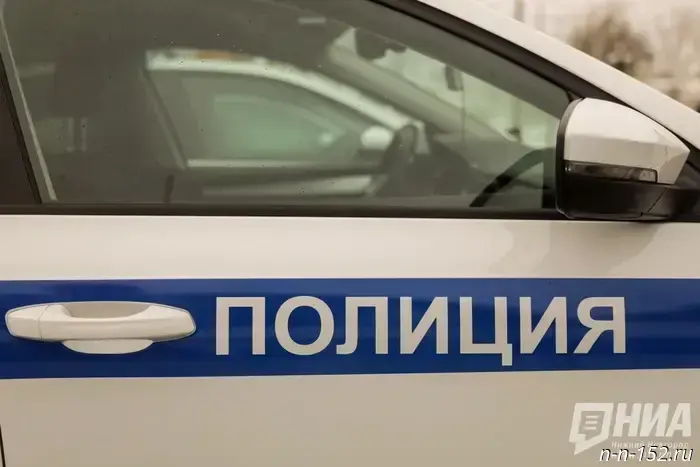 The number of rapes increased by 84% in Nizhny Novgorod Oblast.
Nizhny Novgorod News
The number of rapes increased by 84% in Nizhny Novgorod Oblast.
Nizhny Novgorod News
.jpg) An entrepreneur from Nizhny Novgorod succeeded in having a fine overturned after an error was discovered in the Unified State Register of Real Estate (EGRN).
Nizhny Novgorod News
Badra Gunba and Gleb Nikitin held a working meeting in Abkhazia.
Delegation of the Nizhny Novgorod Region has arrived on a visit to the Republic of Abkhazia
A delegation of the Nizhny Novgorod Region, headed by Governor Gleb Nikitin, has arrived on a visit to the Republic of Abkhazia. 30.09.2025. Newspaper Rayonny Vestnik. Nizhny Novgorod Region. Pervomaysk.
An entrepreneur from Nizhny Novgorod succeeded in having a fine overturned after an error was discovered in the Unified State Register of Real Estate (EGRN).
Nizhny Novgorod News
Badra Gunba and Gleb Nikitin held a working meeting in Abkhazia.
Delegation of the Nizhny Novgorod Region has arrived on a visit to the Republic of Abkhazia
A delegation of the Nizhny Novgorod Region, headed by Governor Gleb Nikitin, has arrived on a visit to the Republic of Abkhazia. 30.09.2025. Newspaper Rayonny Vestnik. Nizhny Novgorod Region. Pervomaysk.
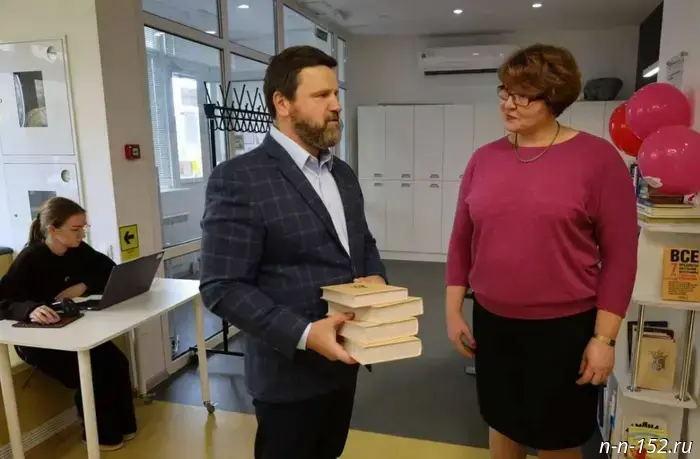 United Russia's party task force continues to oversee the implementation of the people's program in the Nizhny Novgorod region.
Nizhny Novgorod News
United Russia's party task force continues to oversee the implementation of the people's program in the Nizhny Novgorod region.
Nizhny Novgorod News
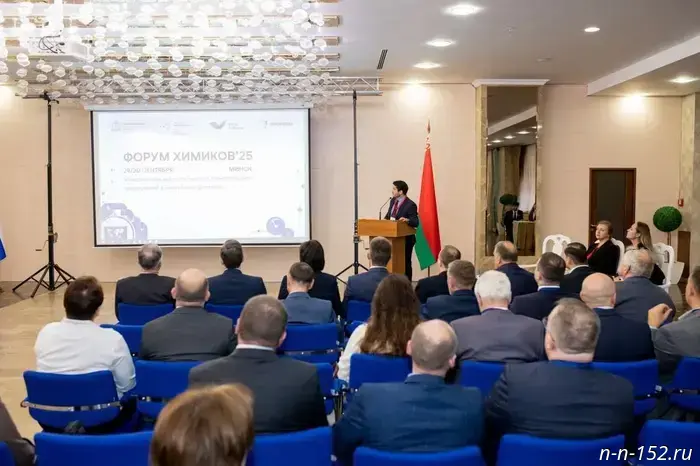 Russian and Belarusian chemists strengthen ties at a forum in Minsk.
Nizhny Novgorod News
Russian and Belarusian chemists strengthen ties at a forum in Minsk.
Nizhny Novgorod News
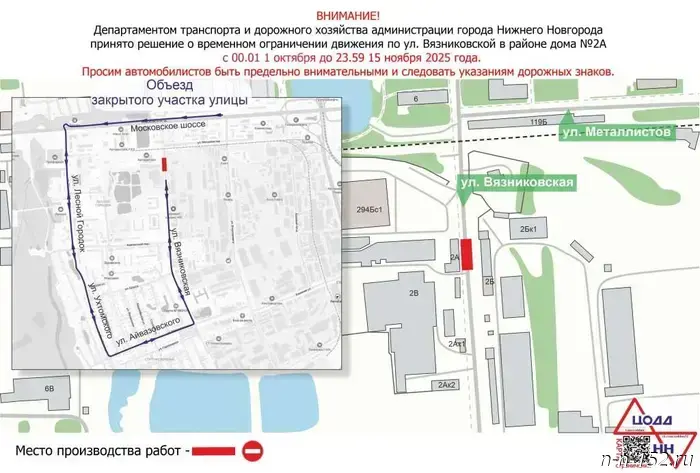 Traffic on Vyaznikovskaya Street will be restricted from October 1 to November 15.
A detour will be organized along adjacent streets
In Nizhny Novgorod from 00:01 on October 1 until 23:01 on October 1, 2025. City Day newspaper. Nizhny Novgorod. Nizhny Novgorod Oblast. Nizhny Novgorod.
Traffic on Vyaznikovskaya Street will be restricted from October 1 to November 15.
A detour will be organized along adjacent streets
In Nizhny Novgorod from 00:01 on October 1 until 23:01 on October 1, 2025. City Day newspaper. Nizhny Novgorod. Nizhny Novgorod Oblast. Nizhny Novgorod.
Andrei Chertkov: "I've grown attached to Donetsk."
Nizhny Novgorod News
